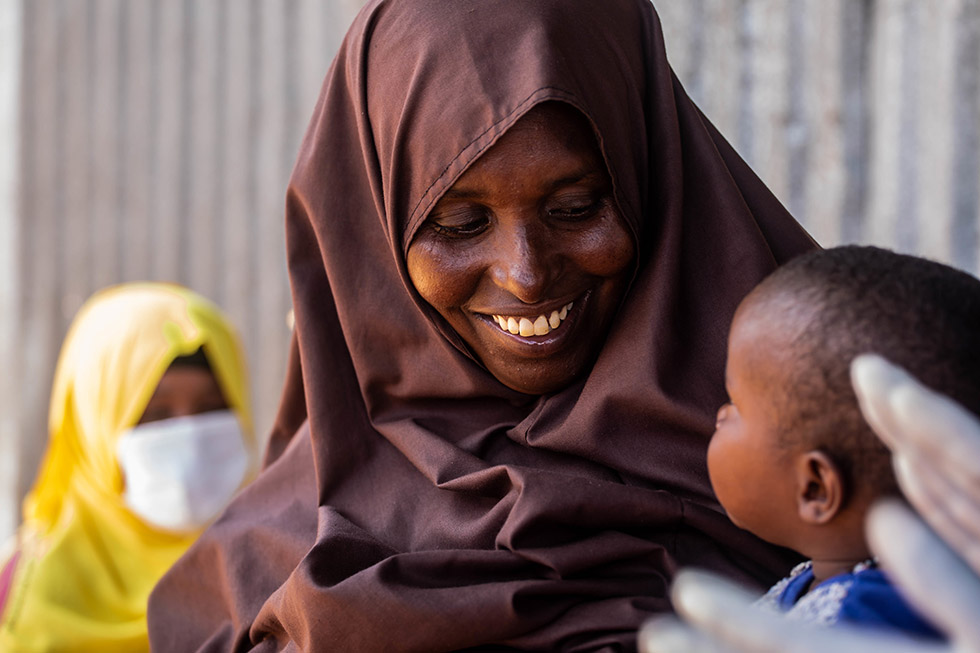
7 April 2025, Mogadishu, Somalia – World Health Day, observed annually on 7 April, marks the anniversary of WHO’s founding in 1948. Each year, the day highlights a pressing health issue affecting populations around the globe.
Healthy beginnings, hopeful futures, the World Health Organization’s (WHO) official theme for World Health Day 2025, focuses on improving maternal and newborn health and survival and addressing the urgent need for action to reduce maternal and neonatal mortality rates worldwide.
This World Health Day, WHO, in partnership with the United Nations Population Fund (UNFPA) and the United Nations Children’s Fund (UNICEF), is highlighting the need for coordinated action to protect the health and well-being of mothers and newborns in Somalia where the maternal mortality ratio, neonatal mortality rate and under-5 mortality rate are among the highest in the world.
Neonatal mortality accounts for 33% of under-5 mortality in Somalia, more than twice the global average. The 3 leading causes of neonatal mortality are birth asphyxia/trauma, prematurity, and sepsis. Inadequate, inaccessible, and poor-quality health services are associated with high rates of neonatal, child, and maternal mortality. In Somalia, access to skilled healthcare providers during childbirth is limited, with only 32% of births attended by trained professionals. The statistics underscore the urgent need for comprehensive integrated interventions to address preventable causes of maternal and neonatal deaths across the country.
Somalia is making substantial strides toward achieving universal health coverage through a national roadmap that aligns with its health policy. With support from the WHO and various partners, the emphasis is on strengthening the health system, particularly at the primary care level, to ensure that essential health services are accessible to all communities.
"The Federal Government of Somalia is committed to advancing universal health coverage through a robust national roadmap, aligned with our health policy. With the invaluable support of our partners, we are focused on strengthening our health systems, particularly at the primary care level, to ensure equitable access to essential health services for all Somalis" says H.E. Dr. Ali Haji Adam, Minister of Health.
“On this World Health Day, we reaffirm our commitment to ensuring that every mother and newborn in Somalia has access to quality, lifesaving health care. Maternal and newborn health is not just a health priority, it is a fundamental human right and a cornerstone of a strong, resilient health system. In a country where maternal and infant mortality rates are among the highest in the world, investing in skilled birth attendance, essential medicines and strengthened health care services is critical to saving lives. Together, we must work towards universal health coverage so that no mother or child is left behind," says WHO Representative in Somalia Dr Renee Van de Weerdt.
“On this special day, I would like to emphasize the urgent need to prioritise maternal and newborn health. Every mother deserves a safe pregnancy, and every newborn has the right to a healthy start in life. These are fundamental human rights, which we can strengthen by investing in stronger health systems and providing quality health care to every mother and child,” said UNICEF Representative Wafaa Saeed. “It is equally important that we continue to invest in trained and skilled health professionals who will help to prevent complications and save lives, especially in remote areas. Let us work together to ensure that no mother or child is left behind in the journey towards better health and well-being for all.”
"Ensuring safe pregnancy and childbirth is a fundamental human right. Too many mothers and newborns in Somalia are dying from preventable causes, and this must change. With a critically low midwife-to-population ratio of just 1.5 midwives per 10 000 people—far below the WHO-recommended 14 per 10 000—the country faces a severe shortage of skilled birth attendants. To bridge this gap and provide safe maternal and newborn care, an additional 20 000 midwives are urgently needed. Through our partnership with WHO and UNICEF, UNFPA remains committed to strengthening maternal and newborn healthcare by increasing access to skilled birth attendants, quality emergency obstetric care, and life-saving interventions. Strengthening these efforts will help turn the tide on maternal and neonatal mortality and give every mother and child a healthy start in life.“ Dr Mary Otieno, Representative a.i. UNFPA Somalia.
The adoption of a key resolution, Accelerate progress towards reducing maternal, newborn and child mortality in order to achieve Sustainable Development Goal targets 3.1 and 3.2, by the 77th World Health Assembly in May 2024 saw Somalia commit to reducing maternal, newborn and child mortality through the roll out of the Essential Package of Health Services and expansion of universal health coverage. Key priorities in addressing urgent health needs include:
expanding essential health care services with the active involvement of all stakeholders;
partnering with private health care providers to improve access to maternal, neonatal and child health services;
enhancing the quality of care by strengthening professional education and sustaining the health workforce; and
scaling up surveillance and response to maternal and perinatal deaths.
WHO, UNICEF and UNFPA Somalia urge global and local partners to unite to achieve these health goals and ensure a healthier future for mothers and newborns.
World Health Assembly 77th Resolution
World Health Day 2025: Healthy beginnings, hopeful futures
For additional information, please contact:
WHO: Myriam Haberecht, This e-mail address is being protected from spambots. You need JavaScript enabled to view it
Somalia Ministry of Health and Human Services: Mohamed Osman Dahir, This e-mail address is being protected from spambots. You need JavaScript enabled to view it
UNICEF: Victor Chinyama, This e-mail address is being protected from spambots. You need JavaScript enabled to view it
UNFPA: Felix Warentho, This e-mail address is being protected from spambots. You need JavaScript enabled to view it




